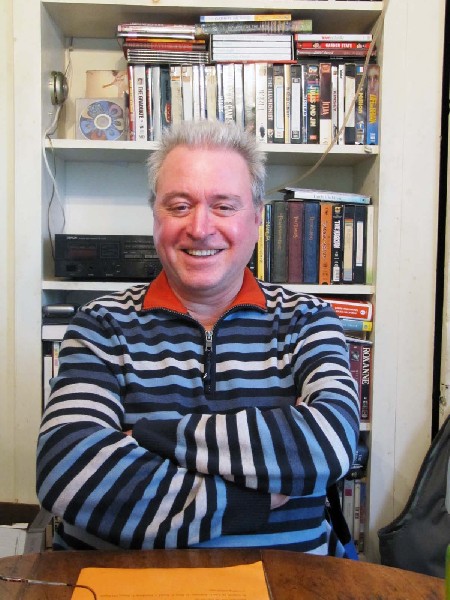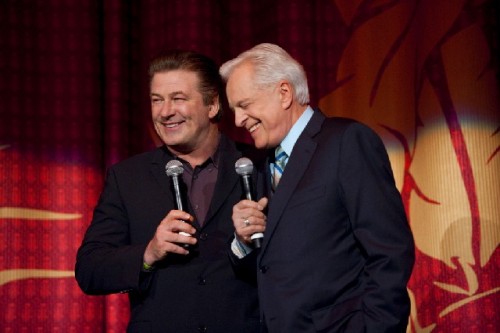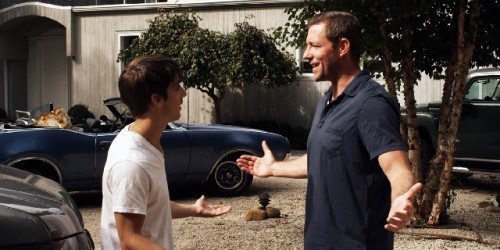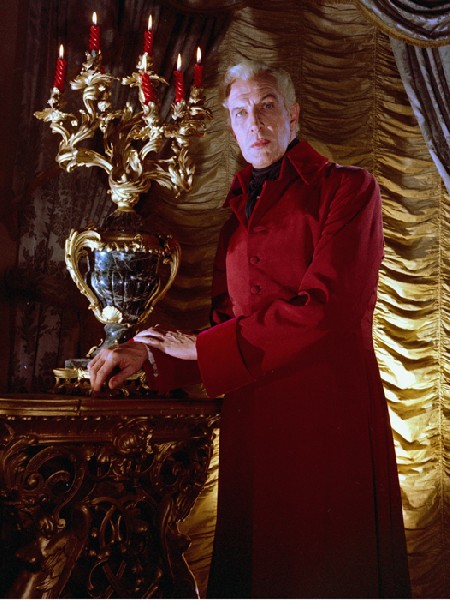Steve Lawson of Williamstown Film Festival
A Life in Theatre and Film
By: Charles Giuliano - Oct 06, 2010
In 1969, while a sophomore at Williams College Steve Lawson worked that summer for the then young Williamstown Theatre Festival. Some years ago, he purchased a modest house in Williamstown with his brother. Later he bought him out. From a base in Williamstown he divides his time in New York and LA keeping up on theatre and film.
Lawson is the Executive Director of the Williamstown Film Festival which will have its 12th season from October 15 through 24. Over two weekends the festival will screen 33 films. To make this selection Lawson sees at least part of some 500 new films each year. It keeps him in the dark all summer with the final schedule due by the end of August.
We met recently in his kitchen to talk about a life in the arts and plans for the upcoming festival.
Charles Giuliano The Williamstown Film Festival is now in its 12th year. How and why did it start?
Steve Lawson I was not in at beginning of the discussions with a group of Williams grads of my generation who go to everything artistic in the region. They felt that this was an area so rich in culture with really world class music, theatre, dance and painting but somehow film seemed to be the missing link.
The group though it would be interesting if there was an intimate film event that would not be about marketing and selling movies but educational, and entertaining. They focused on bringing in artists to talk about their work.
Then, curiously, another group of alumni, about 20 years younger, had simultaneously came up with the same idea. So this diverse bunch of film buffs got together in the summer of ‘98 and started throwing around casually the possibility of such an event getting started.
After a few meetings I was invited to join the discussion by Bob Ware, an attorney in town from Williams, and he knew of my long time affiliation with Williamstown Theatre Festival and he also knew I was very interested in film. The group met about once a month in ‘98-‘99 and basically it got a bit more organized and serious. We established a board of directors and incorporated.
I guess early in ‘99 Bob Ware scored a coup when he persuaded John Frankenheimer, a Williams grad, with a long career as a film director, to come back to the Berkshires and be our first guest of honor.
Once John committed we realized we had to do the event so it became serious. We managed to find five new indy movies that had not been released yet. We held the first season over a weekend in late June of ’99 with five films in two days and John Frankenheimer.
He was the perfect guest. He flew in and we put him to work with a lunch seminar, cocktail party, a dinner, and a tribute at the Clark which was the main event of weekend. We gave him an award. Jim Shepard, who teaches film at Williams, and is on the board, and I moderated a discussion with John at the Clark.
We surprised him with a clip reel of his career which is now a staple of the Festival. The survey of his career started with Birdman of Alcatraz going all the way to George Wallace. John early on had a big film career and then a down period. There was a second career making films for HBO and TNT like George Wallace, Against the Wall, Andersonville, The Burning Season. It was about a 20 minute reel. He was surprised and pleased. It has since become a regular element when we salute an artist.
It’s great as we found it enabled audience to be reminded of what the artist has done and that sparks the questions in the q & a. One event was funny. We knew that during the weekend we wanted to show a couple of classic films. We screened Manchurian Candidate and, at John’s request, also Iceman Cometh which he did for the American Film series on TV. It was the last movie of Frederick March who played Harry Hope and Lee Marvin was Hickey. There is an anecdote about Manchurian Candidate. We started the film. About fifteen minutes in, it was an old print, the film broke. There was white light and normally that would be a disaster. John just jumped up and started telling stories about scenes from the film. He was one of those superb guests you didn’t need to nudge. You just ask a question and lean back.
CG What did that first event cost?
SL The first season cost $32,000. The biggest expense was brining in John. There was no staff and nobody got paid. I wasn’t yet the director. That first season it was done by committee. We appealed to people for money. It was a very shoe string thing and nobody got paid. Due to the success of that season it persuaded us and a lot of people that it was a venture that could continue.
CG How does that compare to the budget today?
SL The budget this year is $150,000.That covers a lot. We bring in artists for shorts and provide lodging for them. For feature artists we pay travel as well. Alec Baldwin and I are friends. We first worked together in ‘87 at WTF when Alec played Sherlock Holmes in the first production of The Free Theatre outdoors at Buxton Field. It was very civic. People brought kids, dogs and picnics.
I have a wonderful out take of a thunder storm cutting short the performance and Alec in his Sherlock Holmes cape yelling his lines into the tempest. Since then, we have worked together on several projects in New York. He came up for Film Festival in 2004. Since then we talked off and on about him coming back this year
He has been co hosting The Essentials which is a show on Turner in which he and Robert Osborne talk about a different classic film each week. They will be narrating a Billy Wilder tribute. There will be several clips of Wilder films. They will talk and then open it up to the audience.
The nice thing about Wilder he was very diverse. In one decade he made Sunset Boulevard and Some Like it Hot. His range was prodigious. People don’t know that Wilder wrote or co wrote all of his films. He never directed anything for which he hadn’t done the screen play.
Wilder started as a second unit guy. He had writing credits in the late ‘30s and ‘40s with films like Hold Back the Dawn and Ball of Fire. You should get that on Netflix. It’s Barbara Stanwyck at her funniest starring with Gary Cooper. It’s wildly entertaining. So that was the last thing on which he was just screen writer.
The next year, 1942, he directed his first feature in the US The Major and the Minor. It stars Ginger Rogers who wants to leave NY and go home to the Midwest but can’t afford the train fare. So dresses up as a 12-year-old. On the train home she winds up in the compartment of Ray Milland. For its time it was very suggestive.
CG Who is Steve Lawson? How did you get into theatre and film?
SL After Williams I went on to Yale earning a degree in criticism. I ended with a degree and a lot of debt. Nobody was hiring critics so, as a substitute, I turned to journalism and got to interview fascinating people like David Mamet, Athol Fugard, John Sales and Francois Truffaut. I published in The New York Times, Horizon, and Saturday Review. I did a piece on David Hare for Film Comment.
While I was a journalist the one constant for many years was WTF. I always came back to Williamstown during the summer to work on the Festival. It was fun because I was in on ground floor of many things like The Free Theatre or the Cabaret.
Nikos Psacharopoulos was associate director for the first year. The director left and from second year on, 1956, he was director. Until ‘55 there was no WTF and no Clark Art Institute. They were both started at the same time. Isn’t that remarkable? Just imagine how sleepy the town was back then. The Clark and WTF are two big reasons why people come here.
I started at WTF while I was at Williams during my sophomore year in 1969. To give you an idea of how small WTF was then, it was the Williamstown Summer Theatre, and not a festival. During my first season I wrote press releases and sold tickets at the same time. Now when you look at huge staff, back then, there were about 20 of us doing everything.
Early on Nikos took a shine to me and gave me opportunities. I was his assistant for one season which is the theatrical equivalent of trench warfare. He was a very exacting personality. If he trusted you he was hard on you because he always thought you could do better. If he thought you were untalented, and had no future at WTF, he ignored you because you would not be back. But I kept coming back.
This past summer I directed the joint WFF/ WTF screenplay reading which we do every summer. 2010 was my 39th season. It’s given me so many opportunities for interesting work during the summer. Like adapting a novel for the Free Theatre, directing a project, or performing in the Cabaret.
It’s also led to work in the outside world. For example, I met Bruce Paltrow through his wife Blythe Danner, and Bruce invited me to write for his TV series St. Elsewhere. It was a very successful medical series. Denzel Washington started on the show. We had to write him out of the last episodes of the final season because he had to go off to the film Glory which shot him to stardom.
I met Joanne Woodward at WTF when she acted in Glass Menagerie. She asked me to write the TV tribute to The Group Theatre of the 1930s. In another project with Joanne she chaired an event at City Center that led to launch of the Encores series of musicals on the cheap. There were no sets and the actors performed from scripts in front of an orchestra.
CG You talked about Nikos as challenging to work for. It seems that to succeed in a life in the theatre you have to be tough on the outside and soft and sensitive on the inside. Like the Sabras in Israel.
SL The best directors in theatre have to be tyrants. Art is not a democracy. That’s true. There is a feeling in America stemming from the pioneer days that anyone can do anything. If that were true we would all be Leonard Bernsteins or Stephen Sondheims. Art means that you do something better or do something that nobody else can do at all. It’s why people support the arts. It’s because they want an experience that someone else can give them because of their unique talent.
That’s one reason why Nikos had such a successful run with WTF. Even when he could have rested on his laurels he didn’t. He pushed and he went further. If you were lucky enough to be part of his vision you got to go along for the ride.
That’s why I applied for this job running WFF. I had the courage to do so because of all those years with Nikos. If you lasted a long time with him you were battle tested. It’s true the more I think about it.
CG Which brings us back to Williamstown Film Festival.
SL In March of 2000 the board voted me into the job as Executive Director of WFF. The message I took away from the meeting was, in essence, congratulations and now go raise your own salary. That famous first year revenue of $32,000 was used up. The next year we had an epic expansion. We went from two to three days and we did our first joint event with Mass MoCA. We saluted David Strathairn who was a friend from Williams a year ahead of me. By then he had not made Good Night and Good Luck. It was nice to honor him.
CG Who are some other Williams alumni in theatre and film?
SL Others would include John Sales, Stephen Sondheim, Elia Kazan, William Finn (of Barrington Stage), and a lot of other interesting people.
I put together a tribute to Kazan in ’85 that brought back a lot of people who had worked with him. We called the event Kyriaki which means celebration in Greek. Joanne Woodward was there, Paul Newman, Celeste Holm, Eli Wallach, Anne Jackson and many others. He was part of the Group Theatre tribute. At one point Joanne, who was interviewing him, asked why Group Theatre never did the classics. They just did American plays. Kazan looked at her and said “We weren’t equipped to do the damned classics. Listen to how I talk.”
CG There is now more than one film festival in the region. In addition to Williamstown Film Festival there is also the Berkshire International Film Festival which is focused on Great Barrington with additional screenings in Pittsfield. What are the similarities and differences?
SL Kelley Vickery (Executive Director of BIFF) and I met when she was planning the festival. She had lunch with me and Bob Ware and said “Can you give me advise” and I cagily said when would your festival be held. She said in the spring so we are not near each other. They are close. In some ways the differences are not big but not tiny. We appeal to very different audiences. Maybe she takes a wider net by including world cinema where our concentration is on American film. My gut feeling is that there are so many talented American film makers who do not get a shot. Also, there is a different feel to the festivals. For one thing BIFF has more venues than we do. The Triplex in Great Barrington has three screens right there. So they have multiple screens whereas everything here happens once. So we are more linear. Everyone moves from one event to the next as a group. Great Barrington is closer to NY so there is a bigger second home component. It’s easier to get up from the city. I’ve been to several opening nights and there’s more of a social component at BIFF with a lot of press coverage. We get press but don’t go looking for it. Frankly, BIFF has its own identity so it doesn’t mean the same thing for them in early June with us in late October. We have films in common. How could we not if you have a certain ethos or taste.
CG How do you choose your films?
SL I choose the films. I’m the programmer. The local board takes home films to screen. This year we had 460 films to consider and that doesn’t count the ones I go after that I see at Sundance or Tribecca. So you are talking about 400 some films this year from which we are screening 33.
CG Do you see all the films that are submitted?
SL I see parts of all of them which is why I have no summer. It is spent in the dark watching movies. At Sundance I see 30 films and and at Tribecca another 30. so about 500 new films each year all told. I got to sundance for five days each year.
CG Do you go to the Toronto Film Festival?
SL No I have stopped going to Toronto. It is too close to us in September. I try to have season set by mid August. In September we are preparing for the festival and it is very busy.
CG Compared to other film festivals WFF seems quite small. How many tickets do you sell?
SL Images Cinema (in Williamstown) has 160 seats. Then we have two screenings at Mass MoCA which has 500 seats. We have an event at the Clark which has 320 seats. Tickets sold through the box office accounts for about one sixth of our income. We sell program ads and charge entry fees. The lion’s share for the festival comes from unearned contributions at about 70 percent which is high.
CG That seems like a lot of pressure. How do you cope with a demanding life in the arts?
SL You have to have a sense of humor. Without that you’re sunk. In the arts God knows you’re not in it for the money. There is no money. If you have the resources to cope with crises a sense of humor is a very valuable weapon. So many people you encounter seem so humorless. You wonder, why are you in the arts,and not law or banking. If you’re nice to people and the artists they will reciprocate. A fair of chunk of the budget goes to the care and feeding of artists. If you treat them well they will come back and that is true in a lot of cases.
CG What are some of the highlights this year?
SL As we have discussed everything screens just once so I have to make the schedule as diverse as possible. This year, by design, it is sorted out well. There is a spectrum of work with two comedies, three dramas, two thrillers and two documentaries. There are nine features and 24 shorts.
WFF is known as a home for the short film. We have done so many. One of nicest compliments occurred one year when we showed a collage of shorts. In the lobby after that one of the directors was almost in tears. I thought we had screwed up the sound on the movie or something. But the emotion was happiness. I asked her why is that? She said “Steve this is the first time I have seen my movie on a big screen.” I almost cried myself. You can’t ask for a better response than that.
At a big festival screenings are going on at the same time all over the place. If you’ve made a short film, and at the same time some starry cast feature is showing, well, guess where the audience will be? It’s not at your short. The fact that we are a linear event assures that everyone has the same movie going experience.
Every season is different but the thing that struck me about our final schedule this year is the number of fine performances by actors like Helen Hunt, Liev Schreiber, Melissa Leo, Kim Catrall.
CG Kim Catrall?
SL She’s terrifc in this film. She amazed me. She’s currently playing Cleopatra in Liverpool. She got terrific reviews when she was in Private Lives in London. She is a serious stage performer.
David Hyde Pierce is in The Perfect Host. He’s an old friend of mine who started at WTF in 1980. We hoped to have him at the screening but he is stuck on Broadway that night in La Bete. The play was revived in London and has moved to NY. He’ll be in that film. Brian Dennehy is in two films. He lives in Connecticut. He’s here for the night of the benefit and at the Sunday screening of Every Day.
One of my favorite things about the festival is the interaction between established artists and kids starring out with their first short. One year we did a short from two young guys from Florida, during the year we honored Patricia Clarkson, who they idolized. When they met her they almost passed out with excitement. Where else but at a film festival do you get that chance? We mix people of all levels of celebrity.










